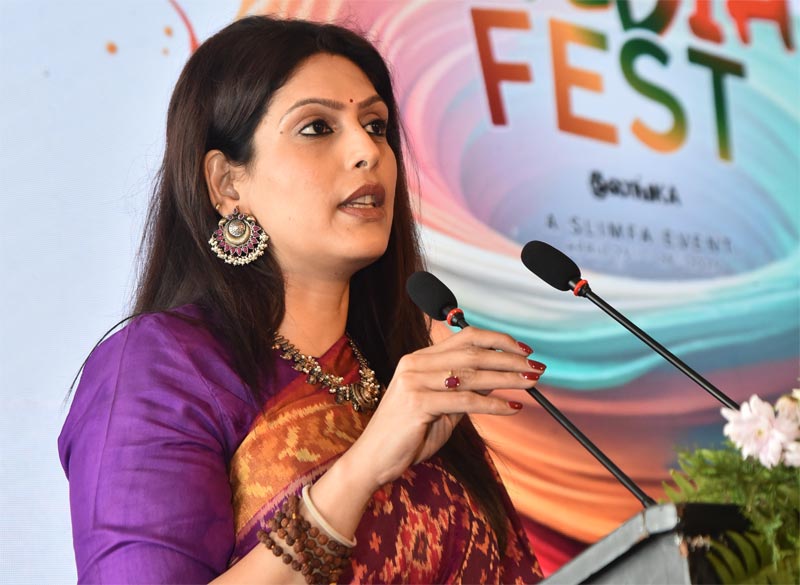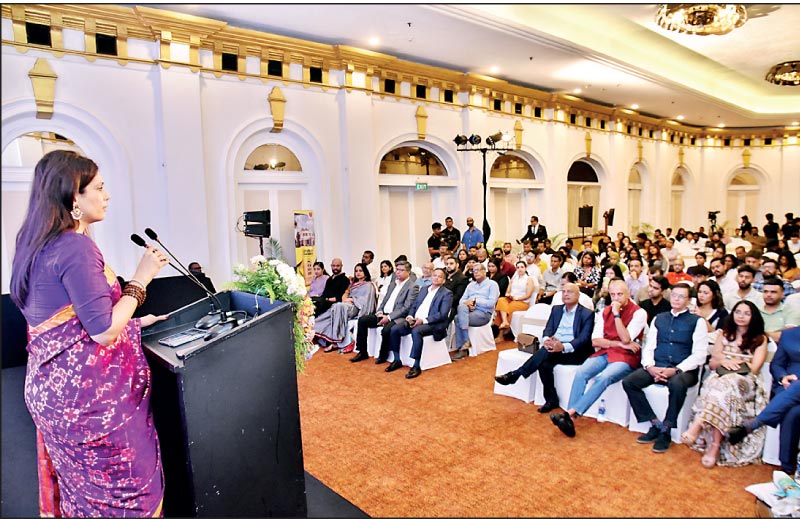Tuesday Feb 24, 2026
Tuesday Feb 24, 2026
Monday, 28 April 2025 04:51 - - {{hitsCtrl.values.hits}}

Well-known Indian TV journalist and influential First Post Managing Editor Palki Sharma delivers the keynote at Sri Lanka’s first-ever Media Festival organised by the Sri Lanka-India Media Friendship Association at the Taj Samudra, Colombo – Pic by Upul Abayasekara
By Charumini de Silva
Well-known Indian TV journalist and influential First Post Managing Editor Palki Sharma on Saturday urged media professionals across South Asia to embrace collaboration, resist polarisation, and reshape the global narrative about the region.
Delivering the keynote on ‘Challenges and Opportunities for Media in South Asia: The Power of Collaborative Journalism’ at the inaugural Sri Lanka Media Fest, organised by the Sri Lanka-India Media Friendship Association (SLIMFA) at Taj Samudra, Colombo, Sharma made a compelling case for South Asian journalism prowess for the betterment of the region.
“We must tell our stories. We need to create a narrative that is fit for our society. We have global forums, we have regional forums, we have groupings, we have alliances on a whole lot of issues – trade, connectivity, security, climate action. Why not the media?” Sharma queried.
She used the SLIMFA Media Fest 2025 platform to urge political leaders in South Asia to consider media as a potential end of collaboration. “Because when we present the right picture before the world, we create the right perspectives and they matter very much,” she stressed.
“When a business is looking to diversify into your country – an investor who is looking to put money in your country, a student who is looking to study your economy, a professional who is looking to relocate and work in your country – will base their decision on their perception of who we are and what we have to offer. So it makes political, economic, and strategic sense to take charge of our stories, to tell our stories ourselves. We know we cannot do it alone. So we must collaborate and engage each other,” emphasised Sharma.
However, she warned that the path to collaboration is scattered with key challenges.
“Our default setting is to think of us as Indian journalists, Sri Lankan journalists, Bangladeshi journalists, Pakistani journalists, but not South Asian journalists. When we cover domestic issues, that should not be a problem, but when we do a story which has a regional direction or relevance, then it is important to have a regional lens. If not, our stories can be skewed at rest and contradictory at first,” Sharma pointed out. “This is the approach that we need to adopt. We use a regional lens to tell stories from South Asia. Why don’t we do it? The biggest one is politics. So political fractures in South Asia have hampered media collaboration,” she opined.
During her keynote, Sharma also listed five main challenges for South Asian media. They were the challenge of news media collaboration, political polarisation, misinformation, lack of funds, censorship, and technological distrust. “It is important to address all of these, because our region has immense potential, possibly more than any other,” she emphasised, and explained what journalists can do in addressing these challenges.
“We have talent, we have stories, we have the audience. All we need is to stop working on these ideas and build something together. Because, I repeat, if we don’t tell our stories, someone else will. And chances are, they will get it wrong again.”
Sharma said the rise of misinformation is fuelled by unchecked digital platforms. “Social media is amplifying lies faster than we can counter them. Platforms are abandoning fact-checking and promoting sensationalism. If we do not address this, the credibility of journalism will continue to erode,” she stressed.
Another major concern she raised was financial instability in the media industry, worsened by the COVID pandemic.
With shrinking advertising revenues and increasing layoffs, Sharma insisted on sustainable business models. “Good journalism needs investment. It is easy to dress up a video and call it news, but real in-depth reporting requires time, money, and commitment,” she said.
She asserted to invest in quality journalism, by focusing on sustainable financial models such as subscriptions and strategic partnerships.
Outlining the impact of new technology like Artificial Intelligence (AI), Sharma urged media professionals not to shy away from technological changes, but to approach them with an open mind.
“AI is already here. Whether we like it or not, it will change journalism. We must adapt and make sure our journalism is not manipulated by technology,” she stated.
Sharma urged to push back against tech giants, protect the integrity of the news content, and advocate for better regulations, similar to moves made in countries like Australia.
Despite the challenges, Sharma remained hopeful, advocating for cross-border engagement, mutual respect, and shared narratives. “We share religions, languages, and histories. We must not let narrow nationalism destroy our common space,” she said.
She proposed more joint programs, journalist exchanges, and shared reporting initiatives to rebuild trust across the region. As a solution, she pushed for stronger engagement focusing on shared regional narratives like climate change, tourism, and economic cooperation—topics that build bridges rather than walls, creating a more unified regional voice.
In a strong appeal for media freedom, Sharma also addressed rising censorship and threats to journalism. She praised the resilience of South Asian journalists working under difficult circumstances. “Freedom of the press cannot be taken for granted. It must be defended every single day,” she added.
She opined that true journalistic freedom demands financial independence, cross-border solidarity, and the courage to challenge political interference wherever it occurs.
Beyond the challenging picture, Sharma’s message was ultimately one of hope in today’s volatile global environment. She called on journalists to break out of silos, embrace collaboration, and rebuild trust, noting that together the media could still drive positive change in an increasingly fragmented world. “We have the stories, we have the audiences—now we must tear down the walls between us and work together,” she stressed.
Sharma expressed gratitude to the SLIMFA for creating a platform to exchange ideas, build trust, and collaborate—as such conversations are not just beneficial but necessary.
Mass Media Minister and Chief Government Whip Dr. Nalinda Jayatissa inaugurated the Media Fest 2025 on Friday, with Acting Indian High Commissioner Dr. Satyanjal Pandey as the Guest of Honour.
Media Fest theme ‘Navigating the New Media Landscape Together’
Under the broader theme of ‘Navigating the New Media Landscape Together,’ the Media Fest 2025 included panel discussions and breakout sessions on a wide range of issues. Apart from Palki Sharma, the Media Fest 2025 also featured New Delhi-based World Is One News (WION) Editor Sidhant Sibal, India Today Group Chief Synergy Officer Shailesh Shekhar, and media research guru and TAM Media Research India CEO L.V. Krishnan. They were joined by several top Sri Lankan media industry personalities.
The first panel discussion, titled ‘AI and Journalism: Integrating Technology for Impactful Journalism’ saw a keynote by Shailesh Shekhar, which featured Dialog Axiata PLC Group Chief Analytics and AI Officer Dr. Romesh Ranawana and Journalist/TV Derana Manager – Current Affairs Kalindu Karunaratne as panellists. The session was moderated by Newswire Editor Kalani Kumarasinghe.
It was followed by the first of the breakout sessions, ‘Mobile Journalism Masterclass,’ that featured Sidhant Sibal and MOJOnews.lk Consultant and MOJO Trainer Ruwan Bogamuwa.
The festival also included a ‘Data Storytelling Workshop’ by data journalism trainer Shihar Aneez and senior journalist and consultant Shehan Baranage.
Post-lunch sessions kicked off with a panel discussion on ‘Building Media Trust in the Era of Disinformation and Content Manipulation,’ with panellists being Palki Sharma, Verité Research Head – Media Research Deepanjalie Abeywardena, Centre for Investigative Reporting Co-Founder/Director Dilrukshi Handunnetti, and Sri Lanka Rupavahini Corporation Deputy Director Foreign News and English News Prasad Kaushalya Dodangodage. The session was moderated by AFP Bureau Chief for Maldives and Sri Lanka Amal Jayasinghe.
Thereafter, a breakout session on ‘Social Media Content Strategy’ was led by Newswire Co-Founder/CEO Umair Wolid and Co-Founder Azzam Ameen. The other breakout session was on ‘Podcasting and Audio Journalism’ by Shailesh Shekhar and Vlog Sri Lanka CEO Bruno Diwakara.
The festival concluded with a session on ‘The Future of Sri Lanka Media: Shared Opportunities and Monetisation’ with a keynote by L.V. Krishnan, followed by a panel discussion comprising Krishnan and Media Fest Sri Lanka 2025 Festival Director Santosh Menon, moderated by SLIMFA President Nisthar Cassim.
At the inauguration, Minister Dr. Jayatissa described the inaugural Media Festival 2025 as a pivotal moment in the region’s media landscape and highlighted it as a platform to promote media excellence and deepen Sri Lanka-India cooperation. (See https://www.ft.lk/front-page/Media-Festival-2025-opens-new-chapter-in-Sri-Lanka-India-media-ties-says-Minister-Dr-Jayatissa/44-775872)
Acting High Commissioner Dr. Pandey hailed the inaugural India-Sri Lanka Media Conclave as a landmark moment in regional media collaboration, commending the SLIMFA for spearheading the first initiative of its kind in the country. (See https://www.ft.lk/front-page/Acting-Indian-High-Commissioner-hails-inaugural-India-Sri-Lanka-Media-Conclave-as-landmark-moment/44-775871)
The Media Fest’s Platinum Sponsor was UltraTech Cement, and Gold Sponsors Lanka IOC PLC and India External Affairs Ministry’s Economic Diplomacy Division. SriLankan Airlines was the Official Travel Partner and Taj Samudra the Hospitality Partner, Outdoor Partner Richardson, and Creative Partner Triad. Gift partners were Spa Ceylon and Dilmah Tea.
